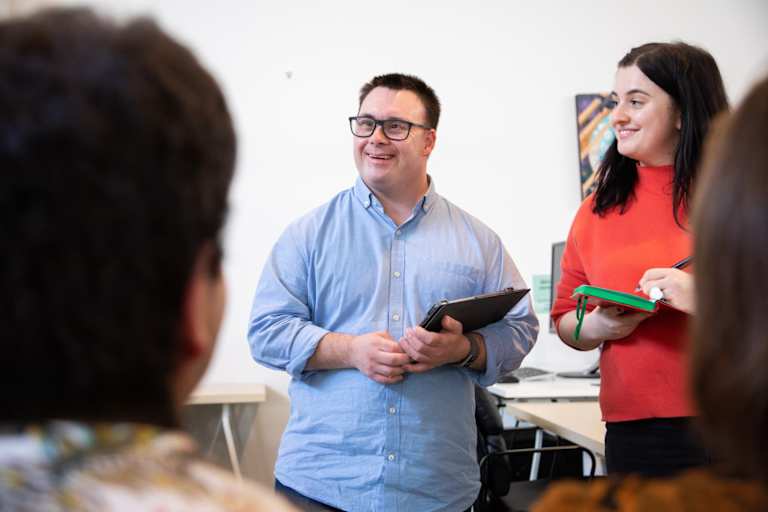Requirements To Become a Licensed Counselor in Georgia
- Licensure Requirements
- How Long Does it Take?
- Out-of-State Licensing
- Licensing Renewal
- Salary Expectations
- Professional Organizations
- FAQ
To pursue a counseling career in Georgia, you must complete several steps to obtain a state license. Explore Georgia counseling licensure requirements, the education and training you need to qualify, and career data in this in-depth guide.
Georgia Counselor Licensure Requirements
Acquiring counseling licensure in Georgia is a rigorous process that requires a graduate degree, work experience, specialized testing, and other requirements — depending on your specialization.
The Georgia Board of Professional Counselors, Social Workers, and Marriage and Family Therapists administers license applications and renewal for licensed professional counselors (LPCs) and marriage and family therapists (MFTs). The Georgia Professional Standards Commission oversees qualifications for school counselor certification.
Licensure candidates can apply for associate professional counselor (APC) credentials after graduating from master’s programs. To obtain a full LPC license and the ability to practice independently in Georgia, an APC must complete all experience and exam requirements within five years.
How Long Does It Take to Become a Counselor in Georgia?
It takes 6-8 years to become a licensed professional counselor, marriage and family therapist, or school counselor in Georgia. This timeline varies depending on the specialization, school enrollment status, and certification pathway.
After earning a bachelor’s degree, which typically takes four years, each candidate needs at least another two years to complete a master’s degree. LPCs and MFTs can expect to spend 2-3 more years fulfilling supervised experience and examination requirements.
Out-of-State Licensing Reciprocity in Georgia
Georgia belongs to the Counseling Compact, which will ultimately allow licensed professional counselors to practice in other member states. However, the legislative process to apply for Compact privileges is not yet in place. In the meantime, LPCs with valid out-of-state licenses may apply for licensure by endorsement if they meet Georgia counseling licensure requirements.
Georgia offers reciprocity to school counselors who hold certifications in other states. Out-of-state applicants typically must pass a Georgia content knowledge assessment unless they have met specific work experience or equivalent content assessment requirements.
How to Renew a Counseling License in Georgia
LPCs and MFTs, including those at the associate level, must renew their licenses every two years. After the initial two-year renewal, each counselor must complete 35 hours of continuing education (CE) during each subsequent renewal cycle. CE credits need to cover at least five hours in ethics and 20 in-person hours.
School counselors in Georgia are required to renew their certificates every five years. During each renewal period, school counselors must complete specific professional development or continuing education requirements, depending on their school or agency.
Salary Expectations for Counselors in Georgia
Your earning potential as a counselor depends on several factors, including your specialization, location, and years of employment. The average yearly earnings for Georgia’s counselors in 2024 ranged from $50,500 to over $70,000, according to the Bureau of Labor Statistics (BLS).
Although average counseling salaries in Georgia rank below national averages, Georgia counseling professionals enjoy a relatively low cost of living. According to cost of living data from the Missouri Economic Research and Information Center, Georgia ranks as the 12th most affordable state.
| Occupation | Average Hourly Salary | Average Annual Salary |
|---|---|---|
| Educational, Guidance, and Career Counselors and Advisors | $33.72 | $70,130 |
| Marriage and Family Therapists | $32.67 | $67,960 |
| Rehabilitation Counselors | $24.27 | $50,490 |
| Substance Use, Behavioral Disorder, and Mental Health Counselors | $29.45 | $61,250 |
| Counselors, All Other | $31.52 | $65,560 |
Professional Organizations for Counselors in Georgia
- Licensed Professional Counseling Association of Georgia: This affiliate of the American Mental Health Counselors Association promotes professional counseling through advocacy, legislative efforts, and professional development resources. The association offers assistance to students pursuing licensure, including consultations.
- Georgia Association for Marriage and Family Therapy: GAMFT supports the state’s marriage and family therapists, establishes and maintains professional standards, and advocates for family health in local communities. Members can benefit from free legal consultations on ethical and licensure issues, professional marketing on the GAMFT Therapist Locator, and competitive rates on liability insurance.
- Georgia School Counselor Association: GSCA draws its membership from school counselors, counseling directors, educators, administrators, and other professionals involved in activities that promote student success and well-being. The association sponsors an annual conference, provides information on research and career development through its online and print publications, and maintains a career center with job listings.
- Georgia Addiction Counselors Association: This state affiliate of the Association for Addiction Professionals has a membership of over 650 addiction counselors and addiction, prevention, treatment, and recovery professionals. GACA has approval from the National Board for Certified Counselors as a continuing education provider.
Frequently Asked Questions About Counseling Licensure
No. Counselors must obtain state-issued licenses to practice in Georgia. Professional counselors must hold valid licenses issued by the Georgia Board of Professional Counselors, Social Workers, and Marriage and Family Therapists. School counselors must obtain certifications through the Georgia Professional Standards Commission.


